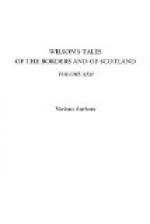“There was only an elderly gentleman and a young leddy accompanied us to the chapel; for Jeannie and her mother said that that was mair genteel than to have a gilravish o’ folk at our heels. For my part, I thought, as we were to be married, we micht as weel mak’ a wedding o’t. I, however, thought it prudent to agree to their wish, which I did the mair readily, as I had nae particular acquaintance in Edinburgh. The only point that I wad not concede was being conveyed to the chapel in a coach. That my plebeian blood, notwithstanding my royal name o’ Stuart, could not overcome. ‘Save us a’!’ said I, ’if I wadna walk to be married, what in the three kingdoms wad tempt me to walk?’
“‘Weel,’ said the auld leddy, ‘my daughter will be the first o’ our family that ever gaed on foot to the altar.’
“‘An’ I assure ye, ma’am,’ said I, ‘that I would be the first o’ my family that ever gaed in ony ither way; and, in my opinion, to gang on foot shows a demonstration o’ affection and free-will, whereas gaun in a carriage looks as if there were unwillingness or compulsion in the matter.’ So she gied up the controversy. Weel, the four o’ us walked awa doun the Lawnmarket and High Street, and turned into a close by the tap o’ the Canon gate, where the Episcopawlian chapel was situated. For several days I had read ower the marriage service in the prayer-book, in order to master the time to say ‘I will,’ and other matters. Nevertheless, no sooner did I see the white gown of the clergyman, and feel Jeannie’s hand trembling in mine, than he micht as weel hae spoken in Gaelic. I mind something about the ring, and, when the minister was done, I whispered to the best man, ‘It’s a’ ower now?’ ‘Yes,’ said he. ‘Heeven be thankit!’ thought I.
“Weel, ye see, after being married, and as I had been used to an active life a’ my days, I had nae skill in gaun about like a gentleman wi’ my hands in my pockets, and I was anxious to tak’ a farm. But Jeannie did not like the proposal, and my mother-in-law wadna hear tell o’t; so, by her advice, I put out the money, and we lived upon the interest. For six years everything gaed straight, and we were just as happy and as comfortable as a family could be. We had three bairns: the eldest was a daughter, and we ca’ed her Margaret, after her grandmother, who lived wi’ us; the second was a son, and I named him Andrew, after my faither; and our third, and youngest, we ca’ed Jeannie, after her mother. They were as clever, bonnie, and obedient bairns as ye could see, and everybody admired them. There was ane Luckie Macnaughton kept a tavern in Edinburgh at the time. A’ sort o’ respectable folk used to frequent the house, and I was in the habit o’ gaun at night to smoke my pipe and hear the news about Bonaparte and the rest o’ them; but it was very seldom that I exceeded three tumblers. Weel, among the customers there was ane that I had got very intimate wi’—as genteel and decent a looking




